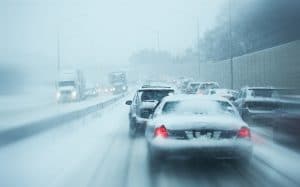It’s Almost Winter in Chicago. Make Sure You’re Safe on the Roads
 Driving in Chicago can be a challenge at time of the year, but winter is an entirely different animal. The Windy City sees an average of 36” of snowfall each winter (though sometimes, it seems like it drops all at once). With plenty of snow on the ground, drivers can easily come across hazardous situations. Not only do the snow and sleet make the roads slippery and wet, but they also lead to ice accumulation, which can contribute to accidents on the road.
Driving in Chicago can be a challenge at time of the year, but winter is an entirely different animal. The Windy City sees an average of 36” of snowfall each winter (though sometimes, it seems like it drops all at once). With plenty of snow on the ground, drivers can easily come across hazardous situations. Not only do the snow and sleet make the roads slippery and wet, but they also lead to ice accumulation, which can contribute to accidents on the road.
There are a few specific bad-weather scenarios that Chicago drivers may face each winter. We wanted to look at three of them, so that you would know what to do if you’re facing them.
Failing batteries are common
The colder temperatures can wreak havoc on your vehicle’s battery. If you have had the battery for a while and your vehicle is parked outside during the winter months in Chicago, you could have a difficult time getting your vehicle to start.
This can lead to some serious property damage if you can’t move your car in time to have the streets plowed, but you could also be sideswiped or t-boned if another vehicle hits your parked car. If your battery does die and you find yourself on the side of the road waiting for help, make sure you set up road flares or some kind of emergency light, so that you are visible to passing cars. If you can safely walk away – say, to a sidewalk or some kind of rest stop – you should do that before alerting police or your roadside assistance. Let them know you are not with the vehicle and have moved to a safe location, and then await instruction.
Hydroplaning on the road
Hydroplaning occurs when the water from the snow and/or rain gets on the tires, causing a slippery sensation while reducing traction to the tires. When the tires do not have traction on the ground, it is much easier for those tires to slip and slide out of control, and that can quickly lead to a serious accident. If the driver of a vehicle loses control because the vehicle is hydroplaning, he or she may end up on the opposite side of the road. The driver could crash into oncoming vehicles or even pedestrians.
Keeping your tires properly inflated and regularly rotated can help reduce the risk of hydroplaning; so can slowing down while you drive, and avoiding standing puddles. If you begin to hydroplane, don’t hit the brakes or jerk the steering wheel. Instead:
- In a front-wheel drive car with anti-lock brakes: gently steer toward open space on the road, and lightly press on the gas pedal.
- In a rear-wheel drive car / car without anti-lock brakes: gently steer toward the open space and ease off the gas pedal.
Low visibility from snow, sleet, fog, or kicked-up water from the road
Drivers are often encouraged to stay put when the snowfall is heavy because it is difficult to get through the roads and see clearly. The same is true when it sleets or rains, but even the after-effects of a heavy snowfall can lead to poor visibility.
If you cannot avoid going out, then at least make sure your car windows are completely defrosted before you start to drive, and keep your lights on. Stick to the speed limit, but if you feel safer driving below that limit, put your hazard lights on while you driver, to alert other vehicles. While you’re on the road, keep a safe distance between you and the car ahead of you, just in case that vehicle has to stop short.
If you are involved in a weather-related car accident and sustain injuries, you can make a claim for damages. At Gainsberg Injury and Accident Lawyers, we are prepared to answer any questions you have for us about the process of making that claim. To schedule a free consultation with a Chicago car accident lawyer, please call 312-600-9585 or contact us for more information.

Attorney Neal Gainsberg has spent the last 20+ years fighting to protect the rights of the injured in Chicago and throughout Illinois. For dedicated legal help with a personal injury, car accident, or wrongful death matter, contact Gainsberg Injury and Accident Lawyers in Chicago for a free consultation.
